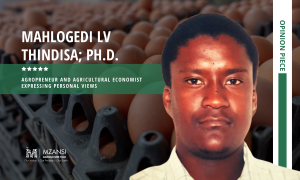Part 1: funding models for black farmers

Mzansi Agriculture Talk brings farmers an inclusive interview with internationally renowned University of Limpopo academic Prof Mokoko Sebola. Appearing in over 500 citations, he has been credited for producing thought leaders in the fields of economics, development, corporate governance, public administration. Ever frank and elaborate, his research titled Financing emerging black farmers for agricultural development in South Africa: A wasteful and unworkable model for creating black farmers, offers an interesting past, current and future deliberation. We bring you the first part of it wherein he dissects the reasons behind the failures of funding models for black farmers.
In the article, I point to three characteristic features of the beneficiaries targeted for funding; and, I show that they include, among other persons, those who may have negligible or no interest in agricultural farming, those who may have no or marginal, perhaps merely subsistence-based, agricultural farming expertise, and those who have no agricultural farming experience.
Note that whereas some may think that apartheid funding model was effective, it was merely targeted at a minority of Whites, implying that a huge pie was shared among a small pool of persons who were themselves keenly interested in agricultural farming and that interest was consciously socially engineered by the apartheid regime. That social engineering included among other things, provision for training, technical expertise support and captive market-security for their products.
Basically, the minority of apartheid regime commercial farmers were guaranteed certain market and sale of their products were secured; and, where the market was flooded with products and non-profitable, they were supported in the process of capitalist destruction of products to create an artificial shortage. In short, the apartheid regime manipulated the captive agricultural market to ensure their agricultural farming was profitable.
Even when a farmer may have had no formal training in agricultural farming, the interest in farming did not only emanate from state social engineering, it was also an intricate and inseparable part of the upbringing of children who would have grown up on farms learning through practice. That is, the situation created during apartheid era was that of lifelong learning; and, the majority of people in the world have grown to be socialised into the career paths through their family lives. Where the farmer had no technical expertise, the state provided for extension services.
The present situation in a democratic state involves the flip side of that same coin. That is, Blacks were alienated from agricultural farming in the early periods of the past century; and, the alienation from land-based activities has meant that their skills and expertise in agricultural farming would be rendered redundant.
The current crop of Blacks who are targeted for funding may have never had any socialisation into agricultural farming because they grew up in families that were recreated to serve as capitalist migrant labourers. So, there is a long history of agricultural farming de-skilling among Blacks; and, for those minorities that had access to farming lands, such lands were severely unproductive and eroded, thereby discouraging any sense of agricultural framing as a productive and professional career path.
Overall, perception of agricultural farming as a profitable career path is extremely weak among Blacks; and, that is not a result of free market forces or default of history, instead it is a result of deliberate social engineering by the apartheid regime.
Funding, or mere training and availability of expertise on their own, cannot regenerate a sense of purpose in agriculture, especially because the majority of black South Africans involved in these programs are faced with the currency of lived experiences that dictates survivalist mode.
But patience is key to agricultural farming, and the South African society is currently characterised by opulence and consumption patterns, albeit among a few black elites, that are not helpful in terms of instilling a sense of patience that is required in agricultural farming. The get rich quick schemes that are now dominant in the South African society, do not provide for the appropriate and enabling environment necessary for the success of the new agricultural farming funding model.
In the current environment of PPE corruption, it should be easier to understand the problem of the absence of an enabling societal environment: for instance, a company submits a tender for R255 million, then sub-contracts to another for R44 million, which in turn sub-contracts to another for R22 million; and, the latter does the work.
How did South Africa get here? In the early days of the South African democracy, Botswana Government complained that South Africa is engineering a culture of impatience with development; and, these are the results of that societal culture. There is copious literature that corroborate these points.
By Prof Mokoko Sebola
Acting Director of School of Economics and Management
University of Limpopo
In Part 2, Prof Sebola focuses on government expenditure on these funding models and the alternatives he proposes.
Disclaimer: The views and opinions expressed in this article are those of the author. They do not purport to reflect the opinions or views of Mzansi Agriculture Talk or its members.



















